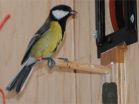(Press-News.org) Physical aggression in toddlers has been thought to be associated with the frustration caused by language problems, but a recent study by researchers at the University of Montreal shows that this isn't the case. The researchers did find, however, that parental behaviours may influence the development of an association between the two problems during early childhood. Frequent hitting, kicking, and a tendency to bite or push others are examples of physical aggression observed in toddlers.
"Since the 1940s, studies have observed an association between physical aggression problems and language problems among children and adolescents. It was also demonstrated around ten years ago that physical aggression problems arise in early childhood when language develops. We wanted to see if this physical aggression/language association existed in toddlers between 17 and 72 months, and if so, who influenced whom," said Lisa-Christine Girard, a postdoctoral researcher with the Research Unit on Children's Behaviour Problems (GRIP) and lead author of the study.
The team of researchers used a longitudinal study of 2,057 French- and English-speaking Quebec children recruited from the Quebec Longitudinal Study of Child Development (QLSCD), conducted by GRIP in association with Quebec's Ministry of Health and Social Services and the Québec Institute of Statistics. Parents were asked to evaluate the frequency of physical aggressions and the language abilities of their children at 17, 29, 41, 60, and 72 months. The parents' behaviours - punitive and affectionate behaviour - were also assessed.
The results of the research show an association between the frequency of physical aggressions and the quality of language development between 17 and 41 months. In fact, children who had low language skills at 17 months committed more acts of physical aggression at 29 months, and the frequency of this aggressive behaviour at 29 months was associated with lower language skills at 41 months. However, according to the researchers, this association was quite low, and the fact that it disappeared at 41 months could be explained by the fact that the 17-to-41-month period was marked by a significant development of language abilities and a high frequency of physical aggression. "Humans use physical aggression most often between 17 and 41 months," explained Richard E. Tremblay, a professor in the Departments of Psychology and Pediatrics at the Université de Montréal, who supervised Girard's research. "After this period, the vast majority of children have learned to use other means besides physical aggression to get what they want, which reduces the likelihood of an association between aggression and language delays in a representative population sample."
Therefore, these findings from a large representative population sample suggest that aggressive behaviours in toddlers are not motivated by language delays, and vice-versa. "We must look elsewhere for an explanation. We know that genetic and neurological factors play a role in the development of these two types of behaviour," said Tremblay.
However, the researchers also noted that during this period, affectionate parenting is associated with low aggression levels and good language development in the children. This observation may indicate that affectionate behaviours of parents can facilitate language learning and the learning of acceptable alternatives to physical aggression. However, it is also possible that low aggression levels and good language development in children encourage parents to be affectionate toward them.
"This study, which is the first longitudinal study to examine associations between physical aggression and language abilities throughout early childhood, is in line with our work on the development of children's physical aggression. It allowed us to look at what the problem was exactly, and when it appears during early childhood," said Tremblay. "Other studies during the first three years of life are necessary; in particular, to better understand the effects of parenting behaviour and genetics that may explain the association between physical aggression and language development."
INFORMATION:
About this study:
Lisa-Christine Girard, Richard E. Tremblay, Jean-Baptiste Pingault (University College London), Bruno Falissard (INSERM, Université Paris Sud and Université Paris Descartes), Michel Boivin (Université Laval and Tomsk State University), and Ginette Dionne (Université Laval) published the article "Physical Aggression and Language Ability from 17 to 72 Months: Cross-Lagged Effects in a Population Sample," on November 6, 2014 in the journal PLoS ONE (online publication).
Notes:
The University of Montreal is officially known as Université de Montréal.
Several factors influence how well a severely premature infant (23 weeks gestation) will do after birth and over the long term, according to researchers at Loyola University Medical Center. These findings were published in the latest issue of the American Journal of Perinatology.
Researchers found that males, multiples and premature infants born in a hospital without a neonatal intensive care unit had a significantly higher death rate. Lack of exposure to steroids before birth and lower birth weights also significantly increased the risk for disability. Some studies suggested ...
MANHATTAN, Kansas -- A research project in the Kansas State University College of Veterinary Medicine presents the largest model to date for evaluating the impact and control of a potential outbreak of foot-and-mouth disease in livestock.
Mike Sanderson, professor of epidemiology in the college's diagnostic medicine and pathobiology department, and Sara McReynolds, a former graduate student of Sanderson's, published the results of their research in the December issue of the journal Preventive Veterinary Medicine.
The researchers developed simulation models to assess ...
How do wealth and culture affect the international success of a new product, especially for those nations that have to wait? According to a new study in the Journal of International Marketing, national wealth and cultural characteristics such as individualism play a large part in citizens' enthusiasm and patience for new products.
"Even if they have to wait, consumers in wealthy countries are less hesitant to spend money on new products. Cultural factors such as individualism increase patience for adopting new products because of the high value placed on social uniqueness," ...
Scientists at the University of Southampton have discovered variations in an enzyme belonging to the immune system that leaves individuals susceptible to Ankylosing Spondylitis.
The variation in ERAP1 can be detected by genetic testing which, if available, could lead to people becoming aware of the risk of the condition earlier.
Ankylosing Spondylitis is a chronic inflammatory disease which mainly affects joints in the spine. In severe cases, it can eventually cause complete fusion and rigidity of the spine, called "Bamboo spine". It tends to first develop in teenagers ...
Glass is mysterious. It is a broad class of materials that extends well beyond the everyday window pane, but one thing that these disparate glasses seem to have in common is that they have nothing in common when it comes to their internal structures, especially in contrast with highly ordered and patterned crystals. Glassy systems can also range in scale: from things like metallic glasses, composed of atoms, to sandcastles, composed of grains of sand.
Researchers at the University of Pennsylvania have now shown an important commonality that seems to extend through the ...
PITTSBURGH (December 9, 2014) ... Precious elements such as platinum work well as catalysts in chemical reactions, but require large amounts of metal and can be expensive. However, computational modeling below the nanoscale level may allow researchers to design more efficient and affordable catalysts from gold. These novel computer simulations to better explore how catalysts function at the nanoscale, led by researchers at the University of Pittsburgh Swanson School of Engineering, was featured as the cover article in the January issue of "Catalysis Science & Technology," ...
When it comes to remembering where a tasty titbit was left, female great tit birds are miles ahead of their male counterparts. This ability might have evolved because the females come second when there's food to be shared, argue Anders Brodin and Utku Urhan of Lund University in Sweden. In Springer's journal Behavioral Ecology and Sociobiology, they present one of only a handful of cases in nature in which the female of a bird species has better spatial and learning abilities than the male.
Great tits (Parus major) are highly intelligent and quick learners. These common ...
Children of the Information Age are inundated with written words streaming across smartphone, tablet, and laptop screens. A new Tel Aviv University study says that preschoolers should be encouraged to write at a young age -- even before they make their first step into a classroom.
A new study published in the Early Childhood Research Quarterly explains why early writing, preceding any formal education, plays an instrumental role in improving a child's literacy level, vocabulary, and fine motor skills. The research, conducted by Prof. Dorit Aram of TAU's Jaime and Joan ...
Princeton University researchers have uncovered a previously unknown, and possibly substantial, source of the greenhouse gas methane to the Earth's atmosphere.
After testing a sample of abandoned oil and natural gas wells in northwestern Pennsylvania, the researchers found that many of the old wells leaked substantial quantities of methane. Because there are so many abandoned wells nationwide (a recent study from Stanford University concluded there were roughly 3 million abandoned wells in the United States) the researchers believe the overall contribution of leaking ...
What drives some subsidiaries to strive for so much autonomy that they are actually harming the parent company? A new study in the Journal of International Marketing shows that these dysfunctional business relationships can be understood and improved using basic psychology.
"A subsidiary's desire for autonomy is psychological in nature. The desire is for more decision making authority in marketing decisions, and the ability to make these decisions without interference from headquarters. Subsidiary employees want to work more independently even if this means risking conflicts ...


